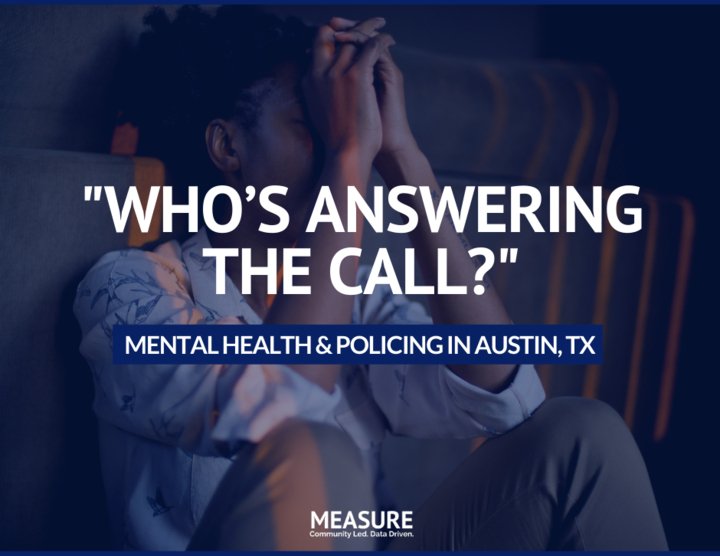
For Austin’s 2020-21 budget, the city council voted to divert police funds to third parties responding to mental health calls via 911. Some funds went to Integral Care’s Expanded Mobile Crisis Outreach Team (EMCOT), mental health clinicians embedded at the 911 call center, additional mental health training for 911 dispatchers, a telehealth tool for first responders, and a staffing increase for Austin Travis County Emergency Medical Services Community Health Paramedics. The expansions will give callers new options for help addressing a behavioral health crisis.
When someone calls 911, the operator asks, “Police, Fire or EMS?” Then from the caller’s story, the operator decides if there is a mental health component. After the budget changes, callers will hear, “Police, Fire, EMS or Mental Health Services?” From there, dispatchers will have new options for getting an assessment at the scene.
Under the current system, most calls result in a police response and a subset also dispatches EMCOT. According to statistics recorded by the APD, 16.5% of emergency calls received from April through June of 2020 generated reports with a mental health component. That’s more than ten thousand calls. Most callers met a police officer, and an unknown number of calls resulted in an arrest and jail. During those months, the APD made 1,436 emergency psychiatric detentions, and only 86 EMCOT referrals. In emergencies dispatched by 911, detentions were almost 16 times more frequent than EMCOT referrals.
Texas law requires a police officer to be present if a person must be involuntarily detained in a psychiatric facility. But many people can be helped without emergency inpatient treatment, and people with serious mental illness are likely to have used up their very limited inpatient insurance benefits. People currently taken to a hospital by police often end up being redirected back to the “free” Travis County mental health beds: beds at the jail.
According to the The Meadows Mental Health Policy Institute for Texas, “From 2016 to 2018, all of the top ten addresses for APD crisis calls for service were medical or mental health facilities.” When a caller seeks voluntary psychiatric care, or officers transport someone involuntarily from an incident to a hospital, the hospital is not obligated to take them. Austin has relatively few inpatient psychiatric beds and not every crisis can or should be addressed with inpatient psychiatric care. The officer is not obligated to stay and see that the person in crisis is admitted. Hospital staff call police frequently reporting patients who are not happy when hospitals say they don’t qualify for inpatient care. Some of these patients have previously been dropped off by an officer. At that point, the sick person can be charged with trespassing and taken to jail. This is a no-win situation for everyone.
To build a more humane and effective “first response” to behavioral health crises, Austin must also offer better options for removing a person from the scene of a crisis and taking them for treatment. This means options other than a psych hospital or a jail bed.
“The whole point is, we need to be diverting calls,” says a local mental health advocate. “We are lacking the intermediate step of a short-term place to deescalate and be connected to services. Not everyone requires in-patient treatment, but we don’t have a continuum.”
The Austin State Hospital is undergoing a major redesign, but current plans will not expand the number of available beds or create the continuum of care needed in Travis County. Available treatment beds are mostly serving those who have been detained during mental health crises, who must receive inpatient treatment in order to stand trial for their criminal charge. These are called “forensic” beds and there’s a huge waitlist for people currently in “mental health” beds in jail. According to the Joint Committee on Access and Forensic Services, as of July, 2020, over 1,100 people in jails across Texas were waitlisted for beds in psychiatric facilities. JCAFS had previously recommended adding 1,400 new beds statewide, and 50 more every following year. However, construction of the State Hospital has stalled, and no new beds have been added.
“The goal should be that one day, people enter the state hospital system through the front door, not through the criminal legal system,” adds the advocate, “and from the state hospital, they transition safely to community reintegration.”
Austin has started to break the cycle of mental health-related criminal charges and jail beds by putting a new system of first response in place. We have to give first responders new options after that fateful first call.
Sources:
Austin Police Department. Crisis Call Diversion Program Process. 2020.
JCAFS. Report of the Joint Committee on Access and Forensic Services for Fiscal Year 2016.
Interview with Integral Care. Phone call. 2020.
Interviews with local mental health advocate. Phone call and emails. 2020.


